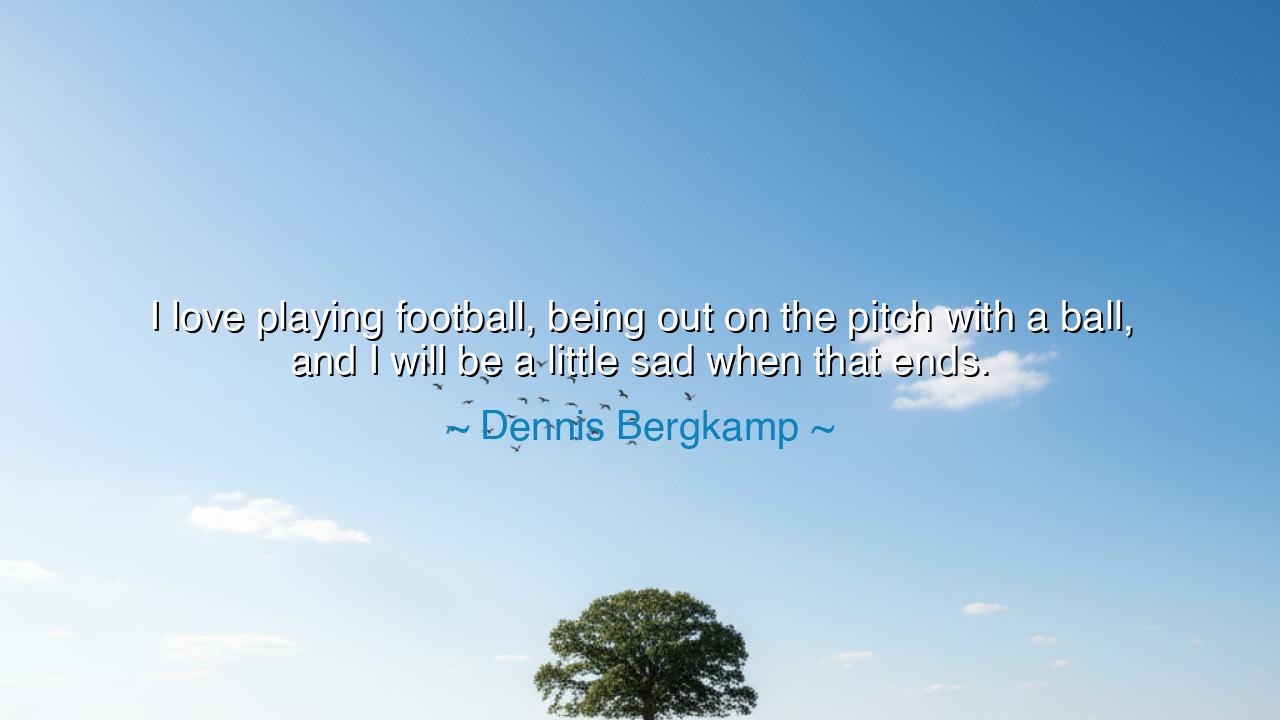
I love playing football, being out on the pitch with a ball, and
I love playing football, being out on the pitch with a ball, and I will be a little sad when that ends.






The words of Dennis Bergkamp, “I love playing football, being out on the pitch with a ball, and I will be a little sad when that ends,” are the quiet confession of a master who knows that all beautiful things, no matter how deeply cherished, must one day fade. They are not the words of regret, but of reverence — the acknowledgment that joy, like the setting sun, shines brightest when it begins to sink beyond the horizon. In these simple words lies an ancient wisdom: that to love one’s craft deeply is to accept its impermanence, and to find peace not in how long it lasts, but in how purely it was lived.
For Bergkamp, football was not merely a profession — it was his temple, his meditation, his way of touching the divine through motion. Each pass, each touch, each goal was not a display of ego, but an act of devotion. He speaks not as a man counting trophies, but as a soul aware that every match, every minute on the pitch, was a fleeting encounter with meaning. His sadness is sacred — for it springs not from loss, but from love. In that sadness, we hear the echo of all who have ever devoted themselves to a calling — the artist who lays down his brush, the soldier who removes his armor, the teacher who closes the final page of a lesson. To give one’s heart to something fully is to know the sorrow of its end.
The ancients often wrote of this feeling — the bittersweet ache that accompanies mastery. The Greek hero Achilles, though destined for glory, knew his fame would be brief, his life shorter than most. Yet he chose the battlefield over a long, uneventful life, because he understood what Bergkamp also knew: that to live fully in one’s purpose, even for a moment, is greater than to drift through a century without passion. Bergkamp’s love of football was of this noble kind — a love that consumed without destroying, that elevated rather than enslaved. His sadness, then, is not weakness, but the mark of a soul that has truly lived in the service of beauty.
To stand on the pitch — the green field under open skies — is for him what the sea was to the ancient sailor, what the stage was to the poet. It was a place where time vanished, where mind and body merged into something eternal. And so, when he speaks of sadness, he is mourning not fame, nor wealth, but the sacred simplicity of that union: the sound of the ball meeting the foot, the hum of the crowd, the flow of the game that made him forget the world. His sadness is not the despair of losing glory, but the melancholy of leaving behind a language his soul once spoke fluently — the language of joy through play.
This truth can be seen in many who have walked the path of mastery. Michelangelo, after carving the great statues of David and Moses, once said that his work was never finished — that he only “freed the figure from the stone.” Even as he aged, he felt the sorrow of one whose hands still longed to create. Likewise, when Bergkamp speaks of his coming sadness, it is the ache of the craftsman who knows his art will outlive his body. But this too is beauty — for in that sadness, there is peace. It means that life was lived deeply, not wasted in half-hearted pursuits.
The lesson in Bergkamp’s reflection reaches far beyond football. It is a reminder to every soul who loves something — be it a person, a craft, or a dream — to love it completely, knowing it will one day end. Do not shy away from passion for fear of loss, for the one who never gives his heart will never know its strength. The sadness of endings is the price of beauty; the one who avoids it also avoids joy. To live like Bergkamp is to walk the path of devotion — to give yourself fully to the thing you were made for, and to accept its end with gratitude rather than despair.
And so, when the time comes for your own “final whistle,” whatever form it takes, may you look back with the same quiet grace as Bergkamp. May you say, “I loved what I did, I gave it my all, and though I am sad to see it end, I am richer for having lived it.” For this is the wisdom of the ancients, spoken anew: do not mourn the setting of the sun — be grateful that you stood in its light.






AAdministratorAdministrator
Welcome, honored guests. Please leave a comment, we will respond soon